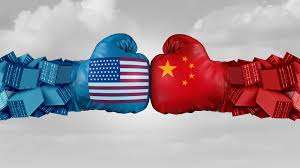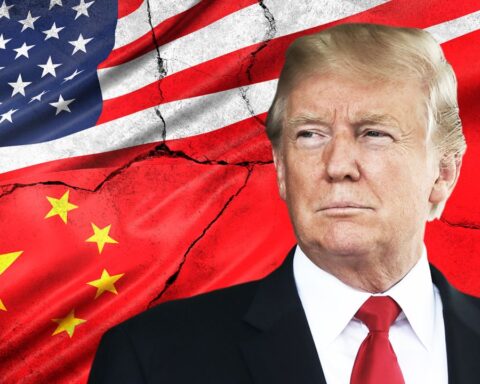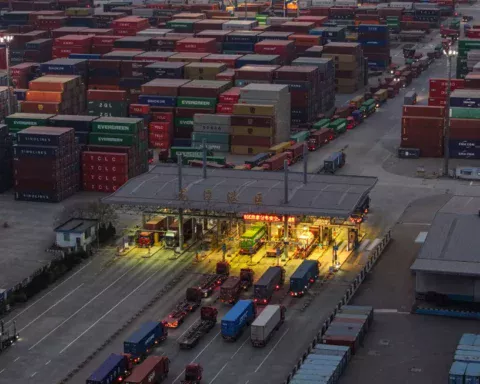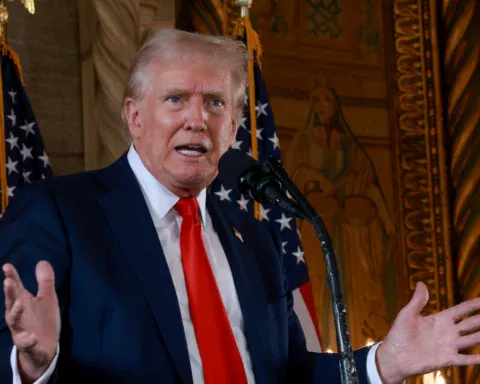As the trade war with the United States escalates, Fareed Zakaria, the renowned CNN host and geopolitical analyst, has offered a piercing analysis of China’s unyielding mentality, encapsulated in the phrase “never yield.”
He argues that Beijing’s approach—rooted in history, national pride, and strategic ambition—shapes its refusal to bow to U.S. tariffs and demands, setting the stage for a prolonged economic standoff.
This article explores Zakaria’s insights, the cultural and political forces driving China’s stance, and the global implications of its defiance.
Tensions reached a new peak in early 2025, with significant developments unfolding by April 12, 2025. President Donald Trump’s administration intensified tariffs, targeting up to 60% on Chinese imports, while Beijing retaliated with measures against American goods and strengthened ties with other nations. Zakaria’s commentary, drawn from his CNN program GPS and recent writings, frames China’s response as a calculated blend of resilience and pragmatism, challenging Western assumptions about its willingness to compromise.
A Historical Lens on Resilience
Zakaria traces China’s trade war mentality to its historical narrative, often called the “century of humiliation.” From the Opium Wars to foreign occupations in the 19th and 20th centuries, China endured exploitation by Western powers, a memory that fuels its modern determination to assert sovereignty.
“The Chinese leadership sees every external pressure as a test of national survival,” Zakaria noted in a March 2025 Washington Post column, arguing that this shapes Beijing’s refusal to appear weak.
President Xi Jinping has leaned into this narrative, casting China’s economic rise as a reclamation of global stature. State media frequently invokes historical grievances, framing U.S. tariffs as a new attempt to subjugate China.
For Xi, yielding to foreign demands risks undermining the Communist Party’s legitimacy, which rests on delivering prosperity and dignity. Zakaria emphasizes that this historical lens makes compromise politically toxic, even if economic costs mount.
‘Never Yield’: Decoding China’s Trade War Mentality
Zakaria’s phrase “never yield” captures Beijing’s public posture, but he cautions that it masks a nuanced strategy. On GPS, he explained that China avoids outright capitulation while selectively adapting to pressure.
For instance, after Trump’s latest tariffs, China imposed counter-tariffs on U.S. agricultural products but spared critical imports like semiconductors, preserving its technological ambitions. “They’re playing a long game,” Zakaria said, “absorbing blows while expanding influence elsewhere.”
This defiance is not mere bravado. China’s leadership believes its economic system—state-driven, with vast domestic markets—gives it leverage to outlast the U.S. in a war of attrition.
Investments in self-reliance, from chip manufacturing to renewable energy, aim to reduce dependence on Western supply chains. Zakaria points out that Beijing’s confidence stems from its ability to control domestic narratives, rallying citizens around shared sacrifice while deflecting blame onto the U.S.
Economic Calculations and Domestic Pressures
China’s economy, though formidable, faces strain from the trade war. Exports to the U.S., a key growth driver, have slumped, with 2024 data showing a 12% drop in bilateral trade.
Factory output has slowed, and unemployment ticks upward, particularly in coastal hubs like Shenzhen. Yet, Zakaria argues, Xi prioritizes stability over short-term gains. Massive stimulus packages, announced in February 2025, aim to cushion domestic industries and boost consumer spending.
Public sentiment, carefully managed by the state, reinforces this resolve. Social media platforms like Weibo pulse with nationalist fervor, with users praising Beijing’s toughness and mocking U.S. “bullying.”
Zakaria notes that this unity, while partly manufactured, constrains Xi’s flexibility. Conceding to U.S. demands could spark backlash, threatening the Party’s grip. “The Chinese people are told they’re winning,” he observed, “and that belief sustains the fight.”
Global Maneuvers and Strategic Alliances
China’s defiance extends beyond tariffs to a broader realignment of global influence. Zakaria highlights Beijing’s efforts to deepen ties with Russia, India, Brazil, and African nations, creating a counterweight to U.S. dominance.
The Belt and Road Initiative, now spanning over 140 countries, secures trade routes and resource access, blunting the impact of Western sanctions. In March 2025, China hosted a BRICS summit, unveiling plans for a yuan-based trade network to rival the dollar.
These moves reflect what Zakaria calls “strategic patience.” While the U.S. seeks allies to isolate China, Beijing courts the Global South, framing itself as a defender of sovereignty against Western hegemony. Trade deals with ASEAN nations have surged, with 2024 figures showing a 15% rise in exports to Southeast Asia. “China’s not just fighting the U.S.,” Zakaria said on GPS. “It’s rewriting the rules of global trade.”
The U.S. Perspective and Miscalculations
Zakaria critiques the U.S. approach, suggesting it underestimates China’s resilience. Trump’s tariffs aim to cripple Chinese industries and force concessions, but Zakaria argues they may backfire.
Higher costs for American consumers—projected to rise 2-3% by mid-2025—could erode public support, while China’s ability to redirect trade mitigates losses. “The U.S. assumes China will crack,” he wrote, “but Beijing’s built to endure.”
The Biden administration’s multilateral strategy, involving G7 and EU partners, had sought to pressure China collectively, but Trump’s unilateralism has strained alliances. European leaders, wary of economic fallout, hesitate to fully back tariffs, with Germany and France advocating dialogue. Zakaria warns that without a united front, the U.S. risks isolating itself, as China exploits divisions to expand its influence.
Risks of Escalation and Global Fallout
The trade war’s trajectory alarms economists, with ripple effects threatening global stability. The International Monetary Fund projects a 1.5% hit to global GDP by 2026 if tensions persist, with developing nations hit hardest. Supply chain disruptions, already severe, could worsen, spiking prices for electronics, clothing, and raw materials.
Zakaria notes that both sides face incentives to escalate—Trump to project strength, Xi to prove invincibility—but neither can fully control the consequences.
China’s defiance carries its own risks. Overreliance on stimulus could inflate debt, estimated at 300% of GDP, while nationalist rhetoric might box Xi into inflexible policies.
Zakaria cites historical parallels, like Japan’s economic standoffs in the 1980s, where missteps led to stagnation. “China’s betting on endurance,” he said, “but pride can blind even the shrewdest players.”
The Role of Ideology and Leadership
Xi’s personal imprint looms large. Zakaria describes him as a leader obsessed with control, viewing the trade war as a test of his vision for a “rejuvenated” China.
Unlike past leaders who prioritized integration with the West, Xi embraces confrontation, believing China’s rise demands it. His policies—crackdowns on dissent, tech self-sufficiency—reflect a worldview that equates compromise with weakness.
This ideology permeates China’s bureaucracy, where loyalty to Xi often trumps pragmatism. Zakaria recounts anecdotes from diplomats, shared on GPS, of Chinese negotiators stonewalling trade talks to avoid appearing soft. “It’s not just policy,” he said. “It’s a mindset, drilled into every level of government.”
What Lies Ahead: A Protracted Struggle
Zakaria predicts a drawn-out conflict, with neither side willing to concede. China may offer minor concessions—say, easing market access for U.S. firms—to de-escalate without losing face, but structural reforms demanded by the U.S., like ending state subsidies, are non-starters. Meanwhile, Trump’s push for decoupling could accelerate, though Zakaria doubts its feasibility in a globalized economy.
The stakes extend beyond economics. A prolonged trade war risks militarizing disputes, particularly in the South China Sea, where U.S. and Chinese forces already skirmish. Zakaria warns of a “new Cold War,” not just ideological but economic, with the world split into rival blocs. “China’s ‘never yield’ isn’t a slogan,” he said. “It’s a blueprint for a different global order.”
A Clash of Visions
China’s mentality, as Zakaria dissects it, reflects a nation poised between confidence and caution, driven by history yet constrained by modern realities. Its refusal to yield challenges the U.S. to rethink its strategy, while the world braces for turbulence.
For Beijing, the trade war is not just about tariffs but about asserting its place in a multipolar era. For the U.S., it’s a gamble on whether pressure can bend an adversary that sees surrender as unthinkable.
This article draws on reporting and analysis from the BBC, CNN, NBC, Fox News, The New York Times, and other media outlets.
Focus Keywords: Fareed Zakaria, China trade war, never yield, U.S. tariffs, Chinese mentality, Xi Jinping, global trade, economic standoff






